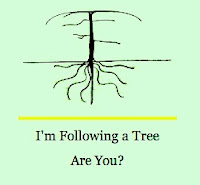Two days ago, I took a few photos of Flash and Spike, the trees I'm following this year. As you can see, there's nothing left of the little bit of snow that was on the ground a month ago. It's been dry, dry, much too dry!! My too-big-to-water yard is covered in native grasses adapted to xeric conditions: western wheatgrass, alkali sacaton, prairie saltgrass. Even they are struggling after several years of drought. But they're tough. One day, their normally vigorous selves will return.
I water the young trees whenever temps rise above 40º F, to encourage root growth. But there are no obvious changes above ground, it's too early. So I checked their twigs to identify them using buds and scars. Of course I already know what they are. This was a chance to examine features I usually ignore.
I pulled the Winter Tree Finder out of my stack of tree-finders. These are dichotomous keys at their best—simple and fun. One got me hooked on tree id 50 years ago. With the handy twig diagram and friendly descriptions, I was able to find the various buds and scars, and make my way through the key.
For Spike, I didn't get beyond p. 4: "Sometimes a conspicuous feature ... makes identification easier." There were just two candidates with conspicuous thorns, Honey Locust (nope) and Hawthorns (yes), p 21, where I stopped because: "Hawthorns are far too numerous to cover here." |
| Spike the Hawthorn, with conspicuous thorns and alternate lateral buds. |
With Flash, I made good use of the key, moving smoothly through the dichotomous questions. Tree a conifer or not? NOT. Leaf scars alternate or opposite? OPPOSITE. This year's twig more or less than ¼ inch wide? LESS. Leaf scars narrow, inconspicuous, with 3 bundle scars? YES. Terminal bud egg- or cone-shaped? YES. "It is a MAPLE, go to p 48" where I landed amid many maples, none of which grow here (the book covers midwestern and eastern North America).
Unfortunately, the buds and scars of the slender twigs were hard to photograph even though the wind was just a gentle breeze. I didn't dare cut twigs to photograph inside ... these young trees look like they need every twig they have. Here is my best shot, in fact, my only decent one.
 |
| Flash the Maple. |
I waited until this morning to post, as I was hoping the weather forecast was correct. It was close! Now the scene is very different. The snowfall is going to be "absolutely historic" according to the weather news. If that's the case, then I must be prehistoric! But it IS a lot of snow, and quite wet. The plants and I are happy 😊
This is my contribution to the monthly gathering of tree-followers hosted by The Squirrelbasket. More news here. Join us!






How much snow did you get? I heard about the historic totals in Colorado. We ended up with about 2 inches. But it will melt tomorrow and the days after with a warm-up. My parents used to have Hawthorne trees on a previous property in N. Wisconsin. Beautiful trees!
ReplyDeleteBeth, we got about 18" I think ... hard to tell because it was both wet and drifted. I had some 3' drifts in my yard, fine by me. The plants need it :)
DeleteA most enjoyable, and interesting, post and good pictures. Absolutely historic snow sounds rather ominous. Take care. xx
ReplyDeletethanks, Flighty :) Turned out to be not so historic here in the Laramie Valley. But still plenty of moisture for the plants.
DeleteGreat post - very informative, thank you! The Winter Tree Finder book looks great, I'll have to see if I can find a similar thing for this side of the pond.
ReplyDeleteThanks, Andrew, I'm glad you found it useful. The tree-finders are super fun, I hope you find something similar.
DeleteWell done with your identification - I could also do with a book like that! I am hopeless in winter, even if I had already met the tree and recognised it in summer.
ReplyDeleteI am pleased you wanted the snow - I often forget it's made of WATER...
All the best for a spring and summer of suitable weather :)